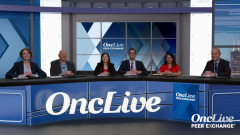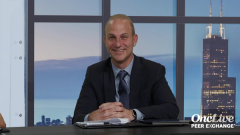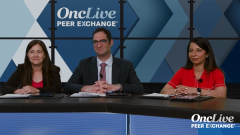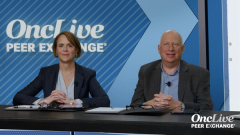
Optimal Molecular Testing Practices in Non–Small Cell Lung Cancer
Expert panelists share insight on molecular testing practices across all subtypes of non–small cell lung cancer to optimally inform treatment decisions.
Episodes in this series

Transcript:
Benjamin Levy, MD: Hello, and welcome to this OncLive® Peer Exchange titled “Advances in Testing and Targeted Therapy for Non–Small Cell Lung Cancer:
Translating Evidence to Clinical Practice.” I'm Dr Benjamin Levy, an associate professor at Johns Hopkins School of Medicine [in Washington, DC]. A panel of experts in the field of lung cancer joins me today. I would like to welcome my esteemed fellow panel to introduce themselves.
Jessica Donington, MD: I'm Jessica Donington, professor of surgery and chief of the section of thoracic surgery at the University of Chicago [Chicago, IL].
Jonathan Wesley Riess, MD: I'm Jonathan Riess, medical director of thoracic oncology and associate professor of medicine, University of California, Davis Comprehensive Cancer Center [in Sacramento, CA].
Alexander Spira, MD: I'm Alex Spira, medical oncologist with Virginia Cancer Specialist in US Oncology Research.
Heather Wakelee, MD: I'm Heather Wakelee, chief of the division of medical oncology at Stanford University [in Stanford, CA] and deputy director of the Stanford Cancer Institute, and president of the International Association for the Study of Lung Cancer, IASLC.
Chaitali Nangia, MD: Hi, I’m Chaitali Nangia. I am a medical director of head and neck oncology for the Verity Health Systemand also co-director of the immunotherapy program at Hoag Cancer Institute in Newport Beach [CA].
Benjamin Levy, MD: Let's dive right in. I think, appropriately, we’ll start with molecular testing and non–small cell lung cancer. I'm biased. I think we all are, but lung cancer is truly the poster child for precision medicine and lung cancer. Of course, we have EGFR and ALK as chapters 1 and 2 of this precision medicine story, but the story is still being written. It's quite remarkable. I'm going to start with Dr Chaitali here. Can you give us your approach on molecular testing at your institution, what you're testing for, how you're testing, and then how you're using that information to make treatment decisions?
Chaitali Nangia, MD: I do agree that lung cancer has been the pioneer in getting precision medicine up-front, and hopefully, the tumor types will follow as well, too. I think molecular testing is a key component. It's almost like a diagnostic evaluation—like we do staging workup. I think it's a part of staging work-up because as you're looking—all the way from early stages to late stages—you want that information because it may influence your new adjuvant approach—your adjuvant approach, your systemic approaches, and your combinatorial approaches. We pretty much do it at [all] diagnoses for most patients.
Benjamin Levy, MD: What type of testing are you doing? We've witnessed an evolution in testing for lung cancer. We've had single-gene testing and we've moved on to more comprehensive testing. What type of testing are you routinely doing for your patients? Are you doing adenocarcinoma and squamous cell or just adenocarcinoma? How does this hold out in your clinic in everyday practice?
Chaitali Nangia, MD: I think, again, it’s pretty reflex testing based on histology—like adenocarcinoma get more comprehensive testing than the squamous do. They're probably not going to get tested for some mutations, but comprehensive testing—not single-gene testing—and both liquid and tissue if accessible, and not just liquid only.
Benjamin Levy, MD: I think we'll talk a lot about the role of liquid later on in this session. Jonathan, any other comments? At UC Davis, are we doing reflexive testing on all patients, or is the medical oncologist ordering this? How do you do this at your institution?
Jonathan Wesley Riess, MD: That's a great question. We at UC Davis have been not doing reflexive testing, but our medical oncologists generally order the tests, so it's done earlier and in the earlier stages. We do both adenocarcinoma and squamous cell. Now, of course, not just the never/light smokers or when there is scant tissue, but more and more, we're able to match squamous cell lung cancer patients to clinical trials as well. We've been doing that and also with the ADAURA data and EGFR and studies and other oncogene drivers moving to the earlier stages. We've been doing it more and more earlier-stage, not just to identify patients for those trials, but also to think about whether we want to give immunotherapy to some of these patients who may not benefit from those nonsmoking oncogene drivers.
Benjamin Levy, MD: Good point. Immunotherapy doesn't work for everyone. Identifying the genetic alteration up-front can save you. We'll talk a little bit about that later. Heather, at Stanford, is there in-house testing, or are you sending it out? How does this work?
Heather Wakelee, MD: We do a mix of both. I think with a newly diagnosed patient, you balance between wanting the comprehensive [testing], but you also need the fast response, so we do a liquid biopsy, which we send out just because it comes back faster. Our tissue testing is in-house. We do a rapid EGFR and then we still do FISH [fluorescence in situ hybridization] testing for ALK and ROS so we can get those quickly. Then we do a comprehensive panel that is also going to be looking for the fusions and a much larger array.
Benjamin Levy, MD: The turnaround time for your in-house testing is?
Heather Wakelee, MD: It's still 2 to 3 weeks. I think that's the challenge. While we're doing the liquid biopsy, the challenge we all face with the tissue testing is time. Even if you have results come back as fast as possible, you still have to get the tissue and then get the tissue sent out. They still have to extract the DNA. The big challenge that we face as a community is how do we get that information so we can get the patients on the right treatment as fast as possible.
Benjamin Levy, MD: It's a long journey that tissue takes. From the patient, all the way to the lab, and then the bioinformatics and the next-generation sequencing and then the readout and then back to you. A lot of challenges along the way. We'll talk about that. Alex, is the US Oncology [Network] experience maybe a little bit different?
Alexander Spira, MD: It's different. We're a community-based group, so we don't have control over everything. It's multiple institutions. One group can have 3 or 4 or even 5 or 6 hospitals between where we go, and they all do something different. Sometimes they do reflexive testing. Sometimes they don't. It's hard because if you're not in direct ownership of the pathology or work with them exclusively, everybody does something different, and even a different pathologist will do something different as well, so it's a challenge. As we all know, 90% of care is outside of the academic setting, so we are in predominance in this and it's where some of the limitations are.
Benjamin Levy, MD: Jessica, just at the University of Chicago, you're not a medical oncologist. The lone surgeon, we welcome you here. What’s your perspective on the molecular testing that's done at the University of Chicago?
Jessica Donington, MD: Ours is all in-house. We have our own large panel. Everything is a big panel; not my choice, but that's what we do. We're pretty good about getting things as soon as possible. We have an interventional pulmonary team. It's very academic. As soon as they know it's lung cancer, everything gets sent right from there, which I think is really important. They're really focused on getting what they need and making sure if they have another biopsy that they do it. That's been super helpful because you're right: the journey is long, and while tissue's the issue, it's not easy.
Transcript edited for clarity.








































